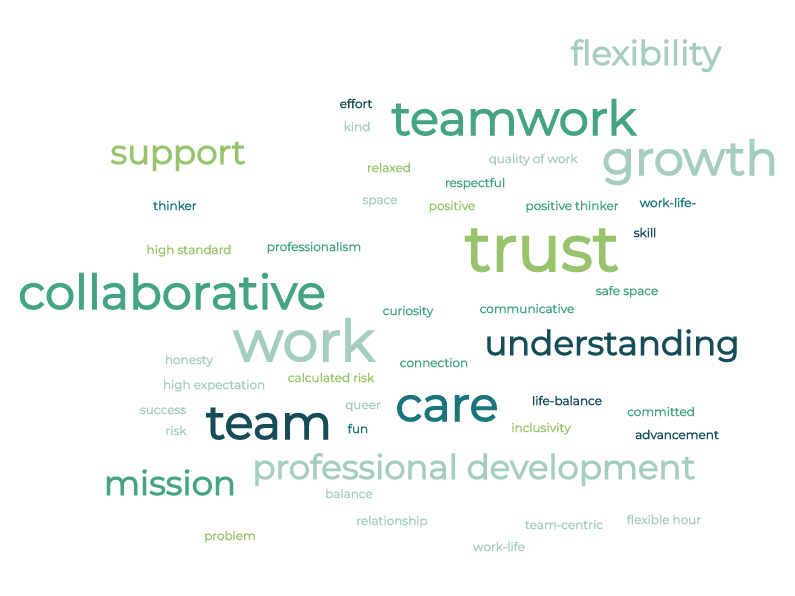To finish our workforce series, we conducted a Q&A with staff to highlight the generational differences of how we all view work.
The generational makeup of Team PPMC ranges from Gen Z to Baby Boomer – and we all have different approaches to work and how we see it play out in our lives.
What kind of work/job culture is important to you?
 It must have a team environment where individuals are willing and have the capacity
to assist with tasks when there is a need. – Paula | Boomer
It must have a team environment where individuals are willing and have the capacity
to assist with tasks when there is a need. – Paula | Boomer
A work culture where we are working together to answer/solve difficult issues but there is a balance of honoring everyone's skills. – Nigel | Millennial
A work culture where it is relaxed, positive, and collaborative. – Kindra | Millennial
Understanding, flexibility, and values the quality of work and not the volume of work or time you put in. – Isabel | Gen Z
How do you think your generation's views of work are different than others?
We are bit more institutionalized and traditional, with our 8-5 work hours, working to work, and how our work-life balance tends to lean. – Paula | Boomer
For my generation work is a means to an end and gives purpose but it is not our sole identifying factor. – Kathy | Gen X
I think my generation has a different expectation of what loyalty is and its definition. The importance of work-life-balance is a priority. People will leave their job without having the balance, as opposed to boomers. – Sarah | Millennial
I feel like we are more open and have changed the idea of what professionalism looks like in certain settings. I feel like my generation wants everyone to have a chance at having success, for example, we care about DEI and collaborative working. – Briaja | Gen Z
I believe we saw our parents and grandparents live unhealthy overbalanced work lives and we do not want the same for ourselves. – JayT | Gen Z
Is there anything else you want to say about generational differences in the workplace?
I think there are strengths from my generation, like valuing hard work without needing recognition or praise. We tend to put in the max effort – not just 100%, but 110%. – Dulcinea | Gen X
I feel like the generation above me has a difficult time adapting to change, while the generations below me are never satisfied unless there is constant change. – Andrew | Gen X
There is a need for intentional communication and idea sharing across generational gaps. When and where in the workforce leadership hierarchy do you see individuals across all different generations sitting at the same table? – Corinthian | Millennial
Now societally we rely on having double- or triple-income households. We are not failing as a generation, we are just living and experiencing different times. – Julia | Gen Z
What are your top priorities when considering taking a job? And what are the most influential when it comes to leaving a job?
We can see from our staff here at the PPMC that values change over time. Among PPMC staff, 100% (6/6) of Gen X employees said mission was their first priority when choosing a job, while 30% (3/10) of Millennials and 33% (1/3) of Gen Z ranked it as first.
Interestingly, when it comes to leaving a job, undesirable company culture was the most cited reason to leave. About one-third (3/10) of millennials ranked company culture as the top reason to leave, compared to 50% (3/6) of Gen X and 66% (2/3) of Gen Z employees.
Low pay followed company culture as a top reason to leave a job. Millennials were most likely to cite low pay as their top reason to leave (50%), compared to 33% (1/3) of Gen Z. Employees of older generations did not cite low pay as their number one priority for leaving.
Baby Boomers are used to the idea of always working eight+ hours/day, five days/week, while Gen Z values the quality of work, over the time it takes. As more employees appreciate work-life balance, how are we prioritizing that, and balancing it with expectations of hard work and high standards?
While we certainly see similar trends nationally, it’s interesting to learn more through a hyper-local approach. And, also to put suggestions into practice, by actually asking your staff about these perspectives. I ask these questions as our own team works to embrace and appreciate different perspectives and expectations. Generational diversity and harmony can be a challenge and a major opportunity for growth, for everyone.

